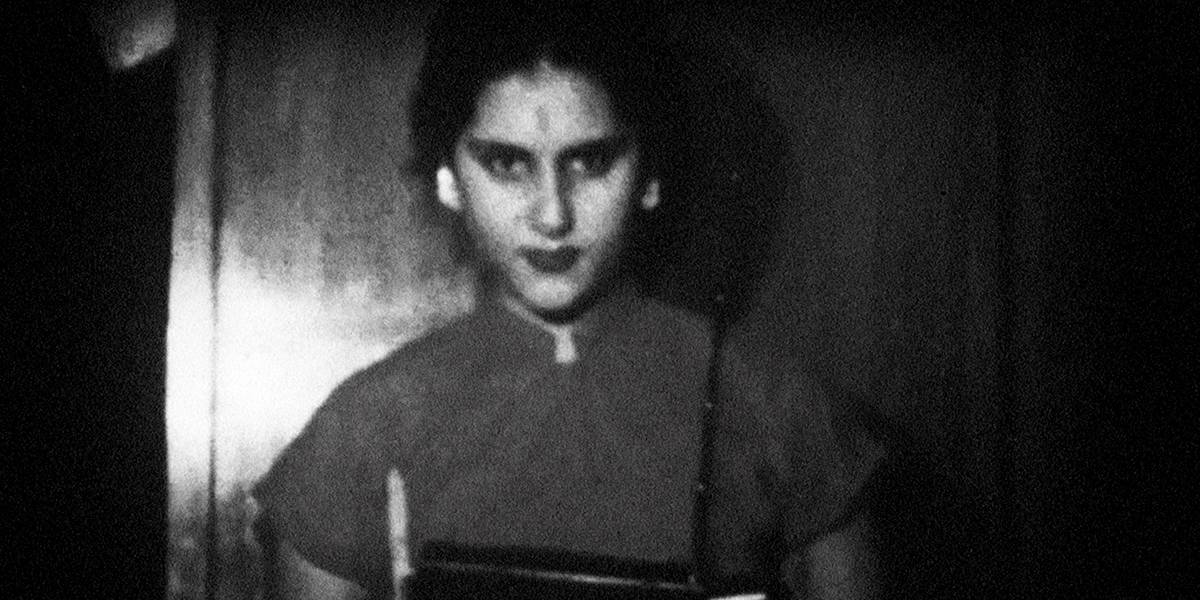“I like when it’s nearly a disaster because I think it’s really, really fun to pull it together,” explains Meneath director Terril Calder. “That’s when you see it taking shape; how it’s all gonna work together.”
The Métis filmmaker is talking about her signature stop-motion animation that fuels her latest short Meneath: The Hidden Island of Ethics. Meneath, which premieres this week at the Toronto International Film Festival, feels like the culmination of Calder’s body of work to date. It’s her fist film with the NFB after forging several shorts as an independent artist, and it lets her talents shine on their biggest scale yet. Meneath provides a darkly humorous story of cultural awakening as Baby Girl, voiced by Lake Delisle, finds herself caught in a duel between the teachings of a two-dimensional Jesus (Kent McQuaid) and the maternal figure of Nokomis (Gail Maurice) atop a dramatic stage that could easily double as a sacrificial altar. The film employs the tactility of Calder’s aesthetic to evoke a dance between love and hate as the young Métis girl undergoes a process of unlearning the colonial practices that have been ingrained in her skull.
Creating Baby Girl

Calder explains that she initially studied 3D computer animation, but found stop-motion to be her passion with its hands-on approach that lets her engage with themes and real world issues in ways that intangible animation might not. “On the last few films, I have been experimenting, mixing the mediums together,” says Calder. “In Meneath, particularly, I wanted the baby to carry the performance, so the sculpt had to be right. It took a while to figure out how she would look because everything else was supposed to exist in a flat, dirty world.”
The cast figure of Meneath is one element that makes the film unmistakably Calder. Her characters create a through-line in her body of work with wide-eyed figures seen in films like Choke, Snip, and Canned Meat. Calder guesses that roughly 90 percent of the material in her work is made from scratch while the rest is found objects. “I sculpt and cast the dolls and in Meneath, there are things in the wings that are actually little objects taken from my other films, and some of those are found objects,” explains Calder. “But as far as the cast and the props used on the stage, those were all made.”
Light vs. dark
The doll-like Baby Girl interacts with a call-and-response between Jesus’s lectures of the Seven Deadly Sins (Lust, Gluttony, Greed, Sloth, Wrath, Pride and Envy) and Nokomis’s compassionate guidance with the Seven Sacred Teachings (Love, Respect, Wisdom, Courage, Truth, Honesty and Humility). Baby Girl finds herself volleyed between a doctrine that emphasizes shame and guilt, versus a principle that values growth and love.
The duel illustrates the ways in which self-loathing becomes internalized, but also how one can break free through an act of self-love. Baby Girl’s journey in Meneath is one of escaping a colonial mindset by immersing herself in the path of her ancestors.
Calder says that constructing this dance between perspectives required some tightrope walking, so to speak. However, engaging in a debate about ethics goes hand in hand with the film’s dynamic and structure. “The young girl trying to find salvation—is she going to Hell?—was the narrative thread that pulls the story” explains Calder. “It was supposed to be a 10 minute film at first, but there’s so much to go through. I didn’t want every little chapter to be anticipated, so it was a process of trying to pull down those chapters to lend a greater flow to the overall piece.”
Humour is healing
As Baby Girl finds herself at the centre of each duel that takes place on Meneath’s starkly constructed stage, the dance between sin and salvation rolls from one debate into the next thanks to Calder’s subversive sense of humour that keeps the pace lively. Despite the weight of the material, Meneath is darkly funny for the contradictions that Calder plays with while elevating Baby Girl from darkness to light.
Calder admits that she often encounters a dance of her own when it comes to retaining the dark sense of humour in her work. Meneath, like her other films, deal with heavy material like abuse, residential schools, mental health, and colonial violence while affording the audience a release through laughter. “I think Indigenous sense of humour is different than other cultures’ sense of humour, and sometimes people don’t get it,” observes Calder. “They don’t understand where the punch line is. I always find that fascinating when showing my films to a full Indigenous audience compared to a non-Indigenous audience because the Indigenous audiences really get the jokes. They land.”
Raising up Baby Girl
Sometimes the jokes might not land, Calder adds, because things can be lost in translation with non-Indigenous crewmembers. That’s not the case with Meneath as the editing by Mi’kmaq filmmaker Jeff Barnaby perfectly matches Calder’s brainwave. Barnaby, who has directed and edited dramas like Rhymes for Young Ghouls and Blood Quantum (for which he won a Canadian Screen Award for film editing), shares Calder’s taste for black humour. Meneath moves at such a pace that the humour accentuates Jesus’s wrathful menace, while the responses from Nokomis buoy Baby Girl’s journey with propulsive, empowering tempos.

“We come from a kind of a similar place artistically,” notes Calder. “He really got the film and he loved it. Jeff cut it so that there was a much better flow. He added some sort of magic that immersed you in it. It felt like it was a ride that kept going forward, instead of starting and stopping.” One feels Baby Girl’s roller coaster ride of emotions as Nokomis keeps raising her up and Jesus keeps pulling her down until her education calls upon her to choose her path.
It helps, too, that Baby Girl has Nokomis lifting her up through the voice talents of actor and filmmaker Gail Maurice. The role is a change of pace compared to the sinister shape-sifting characters Maurice played in productions last year, including her villainous turn in Trickster. Nokomis is a healing presence as Maurice’s soothing and nurturing interpretation contrasts sharply with McQuaid’s sinister Jesus. “Gail just has an amazing light in her,” says Calder. “She’s very generous with that light.”
The openness of Meneath
Calder says she recorded the vocal performances one day before lockdown happened in 2020 and was able to complete post-production in a form of secluded therapy. When asked how the production helped her make sense of all that happened since lockdown began, including further discoveries of extensive graves at sites from Canada’s former residential school system, Calder says she hopes that Meneath’s healing quality extends to a wide-range of audiences.
“When people come and look at the film, they might think that this must be a film about residential school, or this must be a film about abuse. I think this film is broad,” says Calder. “I tried to make a film where everybody could find themselves in some way, like they do with anime. The characters are open so that you can trigger something in you to be able to connect. The last film I did that went to TIFF was called Snip, which really took on the idea of residential school. This one is more about the process of healing, not only healing ourselves, but also healing the colonial institutions we try to navigate intact without changing or feeling like we’re at fault.” Calder sees Meneath’s emphasis on dialogue and critical thinking as a route to invite wider conversations.

“As I get older, I’m more sure that the voice in my head is a good guide, even if I’m the only person in the room who believes that,” offers Calder. “Sometimes it’s really challenging, especially when you’re displaced from your community, and you’re off to school and then suddenly your way is questioned. For me, it’s a matter of saying to myself. ‘No, no, I got this. You got this. It doesn’t have to be their way. It can be your way.’ Peiople have different ways, but I also have to respect my own.”
Honouring Alanis Obomsawin
Calder further brings light to the festival, both literally and figuratively, with a tribute to Alanis Obomsawin that will be playing at TIFF’s retrospective of the legendary Abenaki filmmaker’s work. A trailer for Calder’s next short Seeds: The Art of Alanis Obomsawin screens with the second programme devoted to Obomsawin’s films about Indigenous children. The film is a sound and light show that will be projected onto the ROM in October in honour of Obomsawin’s receipt of the Glenn Gould Prize.
Despite working in very different modes of filmmaker, Obomsawin requested Calder specifically for the job. Even though Calder uses animation to confront reality whereas Obomsawin tackles it in documentary, she says it’s an honour to pay tribute to an artist who had such an influence on her career. “Alanis has affected everyone. She’s extraordinary and it feels like too small of a word,” says Calder. “She’s a gift to all Indigenous artists because she existed at a time where there wasn’t a big community while trying to make change. She navigated the system with so much courage. I don’t think that there’s an Indigenous filmmaker who doesn’t acknowledge her contribution.”
Meneath: The Hidden Island of Ethics premieres at the 2021 Toronto International Film Festival. It also screens at the Ottawa International Animation Festival and imagineNATIVE.
Update (Nov. 21, ’22): Watch Meneath in full below from the NFB!
Meneath: The Hidden Island of Ethics, Terril Calder, provided by the National Film Board of Canada













